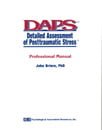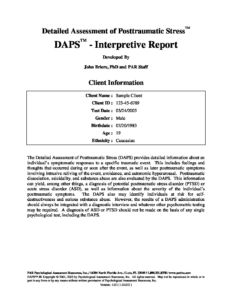
Detailed Assessment of Posttraumatic Stress daps
For: Assess trauma exposure and symptoms of posttraumatic stress in ages 18 years and older
Reading Level: Adult - Elder Adult
Format: Paper-and-Pencil
Length: 20-30 minutes, 15-20 minutes to score
Scoring: Hand Scored
Online Forms, Reports, Kits & e-Manuals
All online resources including Forms, Reports, i-Admins, Kits and e-Manuals.
Printed Kits
Click to browse products
Printed Manuals
Physical printed manuals.
Printed Forms & Handscoring Materials
Test forms, response booklets and scoring reference manuals.
DAPS e-Manual
DAPS online Interpretive Report (each) min order 5
DAPS online Score Report (each) min order 5
DAPS online i-Admin (each) min order 5
DAPS Introductory Kit
DAPS Professional Manual
DAPS Hand Scorable Answer Sheets (50)
DAPS Male/Female Profile Forms (50)
Author
John Briere, PhD
Description
The DAPS is a 104-item detailed and comprehensive clinical measure of trauma exposure and posttraumatic stress in individuals aged 18 years and older who have a history of exposure to one or more potentially traumatic events.
The instrument assesses peri- and posttraumatic symptoms (e.g. intrusion, avoidance, hyperarousal) and associated features (e.g., dissociative symptoms, substance abuse, suicidality) related to a specific traumatic event and generates a tentative diagnosis of Posttraumatic Stress Disorder (PTSD) or Acute Stress Disorder (ASD) in considerably less time than is required for a structured diagnostic interview. The diagnosis can then be confirmed by a clinical interview.
The DAPS assesses both current and lifetime history of DSM-IV-TR trauma exposure, as well as the severity and clinical significance of an individual’s posttraumatic symptoms, including dissociative, cognitive and emotional responses. The DAPS scales include the three PTSD symptom clusters (Reexperiencing, Avoidance and Hyperarousal) and three associated features of PTSD: Trauma-Specific Dissociation, Suicidality and Substance Abuse. Two validity scales identify overreporting and underreporting of psychological symptoms.
The DAPS Posttraumatic Stress symptom scales have higher internal consistency, greater content coverage and higher diagnostic efficiency (.87) than many current measures of PTSD.
Unlike other diagnostic measures of PTSD, the DAPS was normed on a group of 406 trauma-exposed men and women in the general population. As a result, an individual’s DAPS results may be compared (using T scores) to the scores of a large group of men and women with a known trauma history. This facilitates the empirical determination of both severity and clinical importance of the results.
The Professional Manual provides information about the development, administration, scoring, interpretation, and psychometric characteristics of the DAPS. It also provides data from the normative sample of trauma-exposed adults from the general population, as well as from trauma-exposed adults in clinical, community and university validity samples. The Appendix tables provide raw score to T-score transformations based on the normative sample.
NB: Prices are in Australian dollars inclusive of GST. NZ customers need to log in to view ex-GST prices.




